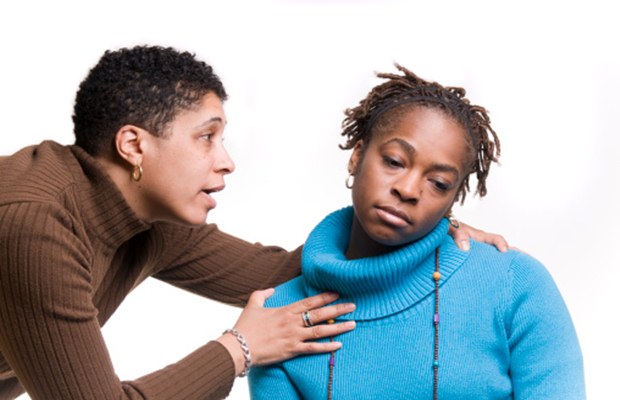Grief is hard. Even professionals trained to help people cope admit that they feel ill equipped from time to time. We weren’t born knowing how to handle grief – we seem made for a life without it.
Even though there’s no end to the list of ways to serve someone who’s hurting, sometimes that intimidates us and cripples us from reaching out. But being a good friend through grief isn’t exclusively the territory of those of us who are trained or especially talented at giving advice and organizing meal deliveries. With a few guidelines, it’s something we all can do.

1. Listen without Judging or Advising
Nobody calls you at 3 a.m. for a pat answer. They’re calling to know that someone’s out there, in their loss, with them.
For now, be okay with not having an answer. Further, be okay with not giving an answer even if you think you have one. Don’t tell them how they’re feeling; let them tell you. Sometimes we steer clear of a friend in crisis because we don’t know what to say, but unless their situation calls for immediate action, we can save our advice and anecdotes. No matter how stellar your stories might be, try letting them rest until another day and simply listen.
2. Validate the Experience of Grief
When a loved one dies, we assure the family, “You’ll see her again!” When a friend goes through a bad breakup we say things like, “At least you didn’t marry him.” We dishonor their experience when we simplify in this way.
Because loss disturbs us so deeply, our impulse is to fill that awkward, empty space in sympathy cards and funeral homes and on the phone, when it feels like nothing else can be said but something should be, with things that sound to us like hope. We desperately want it to be easier for our friends, but we dishonor their grief when we say things like, “It could have been worse,” and remind them to be thankful that it wasn’t.
It might be true that having bits of life untouched by loss will make recovery a little easier eventually. But right now, everything is touched by loss. What your friend needs in that moment is to face the loss squarely and to grieve it for what it is — not to feel guilty for being unable to put a positive spin on the chaos.
3. Support the Process
Some people grieve by being quiet, contemplative, or withdrawn. Some people grieve by shouting unrepeatable things at the heavens. Both are okay, and both require safe places to express the grief. That first wave of grief doesn’t show up in measured doses; it just hits you. To feel that is healthy – not something we should repress.
Minimizing, telling someone, “I wish you didn’t feel so bad,” heaps guilt on top of grief. It communicates that your comfort -and not your friend’s healing- is your priority. Someone who respects your wish not to be made uncomfortable then has to choose whether to express this pain elsewhere or to hide it from you. Neither is a good way to keep a friend close.
These expressions of pain at seeing someone else’s pain usually come from a place of empathy. It’s natural to hurt when someone else hurts. It indicates that we’re probably not sociopaths, which counts as a healthy thing in my book. The trouble comes when we take it a step further and impose our own personality, experience, and theories on grief on someone else.
You might be armed with resilience and a brilliant testimony and excellent theories on grief, but no one can perfectly guide anyone else’s healing process. The best thing that you can do is simply stay beside them, supporting their unique process.
4. Give Grace
It’s hard to be pushed away by a grieving person, or to be on the receiving end of the requisite anger, especially if you’ve grown to count on this person for something that they can’t offer at the moment.
No one gets a free pass for injuring anyone, and healthy boundaries are still in play. But when we’re in the midst of grief, our world is suddenly full of triggers, and normal cycles of life seem foreign. (Everything has changed – how is it possible that the mail is still being delivered?)
In that place, social graces sometimes take a backseat to survival. The occasional exhibit of bad manners doesn’t mean that we dislike you; it means that we feel safe around you. We’ll come around.
5. Don’t Fix
It’s hard, when we’re so thoroughly schooled on time management, retirement planning, and life coaching, to realize how little control we truly have over our lives. We adore the illusion of control. When our naiveté runs out, and we stand there stunned by the violence of the forces that tear the precious things from us, we scramble for a semblance of security. We can’t ever be ready for that moment.
Witnessing someone else’s experience of loss triggers our own fears of loss, so we react to our lack of control in the world by grasping for control over our friends’ reactions.
When we try to fix someone else, we take on a mission that’s never ours. We end up urging our friends to shortcut the necessary work that they need to do, give a nice testimony in church, and move on. People who seem to bounce back quickly might keep us more comfortable, but these people probably have some serious reflection left to do.
The temptation to appear healed before we truly are healed is strong in our self-reliant culture. This happens even in the church, where we react to loss with offerings of hope and commandments about joy instead of holding and comforting and “mourning with those who mourn,” as we’ve been told to do. We know that there’s light at the end of the tunnel and, in that case, we’d like to skip the tunnel altogether and fast-forward to the happy ending.
Healing is always a process, and an often uncomfortable one. What we need is a safe place to let that process unfold. The sooner we embrace that our job is simply to be with our friends in their journey, the sooner they’ll feel like we’re on their team.
6. Stay
We hear that children who have been removed from harmful environments often push against the love of their new support system, not in hopes that it will give, but that it will hold. Adults aren’t especially different. Even subconsciously, sometimes we start to test the staying power of our support system, afraid, and asking, “Are you sure you still want to be here?” Where hard times come as seasons and aren’t a pattern of a destructive relationship, I believe the answer should be yes.
We often relegate teachings about everlasting love to sermons on marriage and hanging our heads over the divorce rate, but that everlasting loving-kindness (in the Old Testament, the Hebrew hesed) speaks to all kinds of relationships.
Months after the first round of cards and visitors and lasagna (why is it always lasagna?) has come and gone, months after it seems like most people have forgotten, the people who are left there beside us, following our lead and honoring our story, are keepers – even if they think they’re clueless and unqualified.
We always have the hope of light after darkness, but sometimes what we need most is a friend who will sit beside us in the dark, saying nothing, and wait with us for the light.
Discover more from ULIZA LINKS NEWS
Subscribe to get the latest posts sent to your email.



